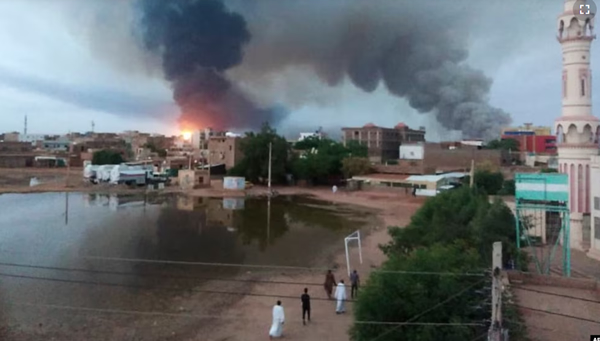
Four months into the war in Sudan, humanitarian leaders are highlighting the devastating impact the brutal conflict has had on millions of people whose lives have been destroyed and whose basic human rights have been violated.
In a statement issued Tuesday, the heads of 20 United Nations and international humanitarian organizations called for “an immediate cessation of hostilities” that have engulfed and terrorized the Sudanese people for months and for the international community to “step up today … and act to put Sudan back on track and end the war.”
Volker Türk, U.N. high commissioner for human rights, condemned the “disastrous, senseless” war in Sudan, which he said was “borne out of a wanton drive for power” and which has resulted in the deaths of thousands, the destruction of homes, schools, hospitals and other essential services.
The U.N. human rights office reports it has “reasonable grounds to believe” both the Sudan Armed Forces and the rival paramilitary Rapid Support Forces have committed serious violations of international humanitarian and human rights law during the conflict, including “violations of international humanitarian and human rights law.”
Türk said the forcible displacement of a massive number of people, as well as acts of sexual violence, “may amount to war crimes” and that perpetrators of these and other crimes must be held accountable.
He expressed “grave concerns that the chaotic situation, mired in impunity, is ripe for exploitation by other opportunistic armed actors and militia groups — and the violence may escalate further as a result.”
The human rights chief’s spokeswoman, Elizabeth Throssell, noted the difficulty of getting an exact number of casualties due to the intensity of the fighting “and the fact that the remains of many of those killed have not been collected, identified or buried.”
Tentative figures, she said “indicate that more than 4,000 people have so far been killed, including hundreds of civilians,” adding that the “actual number of casualties is believed to be much higher.”
Since war erupted April 15, the U.N. refugee agency reports more than four million people have been displaced, more than 3.2 million inside Sudan and over 900,000 as refugees and asylum seekers in neighboring countries.
The agency reports displacement sites within Sudan and in neighboring countries were overcrowded and that it was doing whatever it could “to provide lifesaving assistance” wherever it has access.
In a particularly troubling development, UNHCR spokesman William Spindler said protection and health teams in Chad, Central African Republic, Egypt and South Sudan have been describing horrific ordeals faced by women and girls in Sudan.
“Shocking incidents of sexual violence including rape, sexual assault, sexual exploitation, and physical violence have been reported by women and girls who have fled the conflict,” he said. “These incidents are reportedly perpetrated by fighters, criminals, and smugglers against civilians in Khartoum and other areas as well as those on the move.”
In addition to lasting physical, sexual, reproductive and mental health consequences, the UNHCR reports some survivors have arrived in neighboring countries pregnant because of rape.
Laila Baker, regional director for Arab States for the U.N. Population Fund said her agency was very concerned about the status of sexual and reproductive health in Sudan, noting that more than 2.6 million women and girls of reproductive age required humanitarian assistance.
Speaking by video link from Cairo, Baker said some “260,000 women are currently pregnant, and almost 100,000 of those will give birth over the next three months.”
“Without the critical services including the hospital and safe delivery, their lives and those of their children and the babies that are going to be the future generation are severely at risk,” she said.
She added that another area of great concern is the increase in gender-based violence, including sexual violence in conflict.
“To be unequivocally clear, sexual violence is a war crime and a crime against humanity,” she said, adding that treatment and counseling service providers “have reported a 50% increase in gender-based violence since the start of the conflict, and we know that is only the tip of the iceberg.”
The U.N. human rights office reports it has received credible reports of 32 incidents of sexual violence, including at least 28 cases of rape. It said men in RSF uniform were connected to at least 19 of these incidents as perpetrators, adding that “the actual number of cases is likely to be much higher.”
Meanwhile, the World Health Organization reports the conflict is having a catastrophic impact on peoples’ health and well-being. It reports about 67% of hospitals in affected areas are out of service.
Margaret Harris, WHO spokeswoman, said over the past four months, there have been 53 attacks on health care, which killed 11 people and injured 38, adding that “this has denied access to care for tens of thousands of people.”
Jens Laerke, spokesman for the Office of the Coordination of Humanitarian Affairs, said U.N. humanitarian and political staff based in Sudan have been in daily contact with the warring parties from the start of the conflict.
“You may also recall that at the beginning when all this erupted, Martin Griffiths, the humanitarian coordinator, went to Sudan, and we got commitments from the parties to the conflict that they would adhere to international humanitarian law,” he said. “A lot of that does not seem to have happened, unfortunately.”
Source: voanews.com























